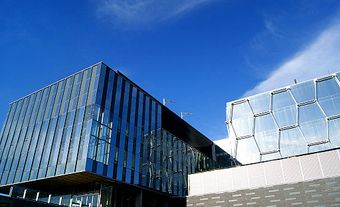The University of Guelph, in Guelph, Ontario, was incorporated in 1964. It was founded based on three founding colleges: the Ontario Agricultural College, Ontario Veterinary College and the Macdonald Institute.

History
The university’s history dates back to 1874 when the Ontario School of Agriculture was established on a farm provided by the Ontario government. In 1880, it became the Ontario Agricultural College (OAC).
In 1903, a division of home economics was added with the construction of the Macdonald Institute. It was financed by Sir William Macdonald ― founder of Macdonald College in Sainte-Anne-de-Bellevue, Quebec (see McGill University) ― as part of a movement led by Adelaide Hoodless to promote domestic science in rural Canada.
Meanwhile, in 1862, Andrew Smith founded the Ontario Veterinary College (OVC) in Toronto. In 1922, the college moved to the Guelph campus.
From 1888 until 1964, the OAC became academically affiliated with the University of Toronto, as were the OVC from 1897 and Macdonald Institute from 1948 onward. In 1964, the University of Guelph was established on the basis of these three founding colleges.
Programs
The university presently has seven academic colleges: agriculture, veterinary medicine, physical and engineering science, biological science, arts, and social and applied human sciences (formed in 1998 in a merger between the former colleges of family and consumer studies and social science).
The university has the School of Environmental Design and Rural Development with programs in rural planning, studies and development as well as landscape architecture. Meanwhile, the School of Hospitality, Food & Tourism Management features programs focused on hotel and food administration.
In 1997, the university assumed responsibility for a laboratory services unit. It also took over the agricultural colleges at Alfred, Kemptville and Ridgetown ― formerly operated by the Ontario Ministry of Agriculture, Food and Rural Affairs (OMAFRA). In addition to its traditional strengths in agriculture and veterinary medicine, Guelph has excellent programs in the basic disciplines of the humanities, the social sciences and the physical and biological sciences. Special programs include food technology, environmental sciences, agricultural and biological engineering, human kinetics, nutrition, hotel and food administration, and landscape architecture.
Research
The University of Guelph is also one of Canada's most research-intensive universities. In 2023, it received more than $160 million in research funding. Core research is generated by a unique partnership between the university and OMAFRA. The relationship has become the basis for a cluster of agri-food research and technology resources around the university and its 30-acre Research Park. Guelph is well-known for its strengths in areas as diverse as agri-food and veterinary medicine, human nutrition and family development, environmental studies and engineering, rural development and planning as well as Scottish history and theatre. Graduate research interests include intervarsity programs in physics, chemistry, biotechnology, industrial and organizational psychology; philosophy, public policy and administration; and history (with the University of Waterloo and Wilfrid Laurier University).
The university maintains ties to several now-independent bodies formerly under its aegis, including the Canadian Network for Toxicology Centres, the Guelph Food Technology Centre, the Guelph Turfgrass Institute and the accredited Maplewoods Centre for Family Therapy and Child Psychology.
Influence
Notable alumni of the University of Guelph include, among others, Toronto mayor Olivia Chow, astronaut Roberta Bondar, singer Jane Sibbery, novelist Jane Urquhart and hockey player Cassie Campbell-Pascall.
The University of Guelph is one of the largest employers in Guelph. Its motto is rerum cognoscere causas ― a quote from Virgil meaning "to learn the meaning of reality." Its colours are red, black and gold. There are currently 30,000 students attending the University of Guelph.

 Share on Facebook
Share on Facebook Share on X
Share on X Share by Email
Share by Email Share on Google Classroom
Share on Google Classroom


